Get N random Rows from a NumPy Array in Python
Last updated: Apr 12, 2024
Reading time·3 min

# Table of Contents
- Get N random Rows from a NumPy Array in Python
- Get N random Rows from a NumPy Array without replacement
- Defining a reusable function
- Get N random Rows from a NumPy Array using
numpy.random.shuffle()
# Get N random Rows from a NumPy Array in Python
To get N random rows from a NumPy array:
- Use the
numpy.random.randint()method to get an array of random indexes. - Use bracket notation to select the random rows with the indexes array.
import numpy as np arr = np.array([ [2, 4, 6], [1, 3, 5], [3, 5, 7], [4, 6, 8], [5, 7, 9] ]) index = np.random.randint(arr.shape[0], size=2) print(index) # 👉️ [3 2] print('-' * 50) random_rows = arr[index, :] # [[4 6 8] # [3 5 7]] print(random_rows)
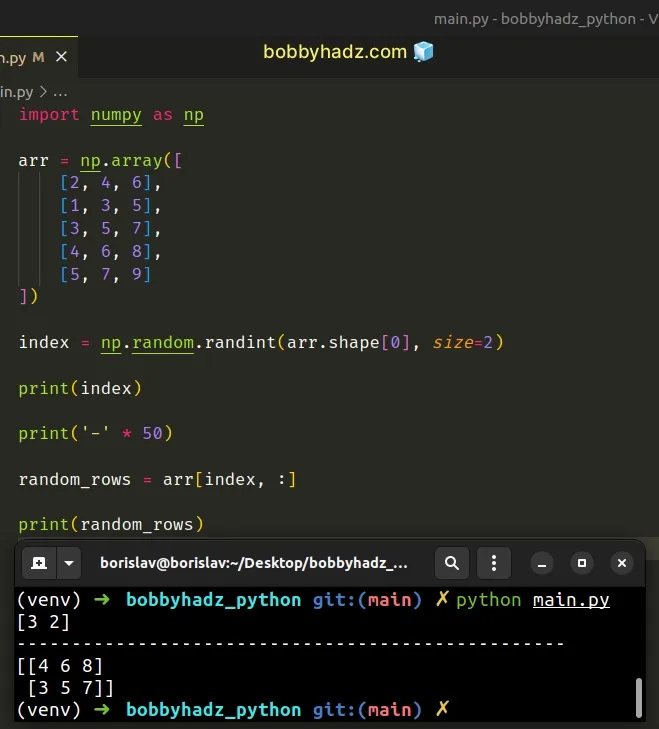
The numpy.random.randint() method returns an array of random integers that we can use to index the original NumPy array.
The code sample selects 2 random rows from the NumPy array with replacement.
In other words, rows can be repeated.
Notice that in the following example, the array of random indexes has repeat values.
import numpy as np arr = np.array([ [2, 4, 6], [1, 3, 5], [3, 5, 7], [4, 6, 8], [5, 7, 9] ]) index = np.random.randint(arr.shape[0], size=4) print(index) # 👉️ [1 2 1 4] print('-' * 50) random_rows = arr[index, :] # [[1 3 5] # [3 5 7] # [1 3 5] # [5 7 9]] print(random_rows)
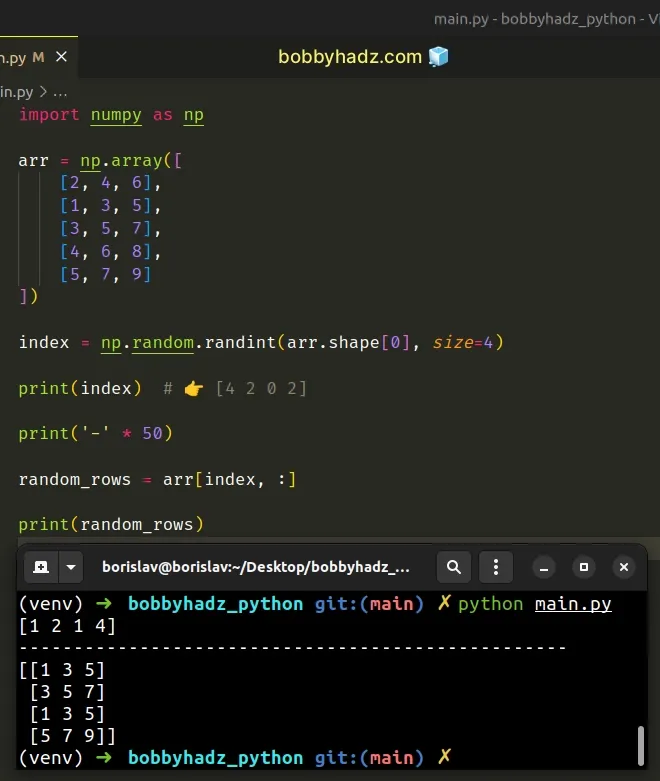
The code sample selects 4 random rows from the NumPy array with replacement (with repeats).
# Get N random Rows from a NumPy Array without replacement
If you need to get N random rows from a NumPy array without replacement (without
duplicates), use the numpy.random.choice() method instead.
import numpy as np arr = np.array([ [2, 4, 6], [1, 3, 5], [3, 5, 7], [4, 6, 8], [5, 7, 9] ]) index = np.random.choice( arr.shape[0], 2, replace=False ) print(index) # 👉️ [1 0] print('-' * 50) random_rows = arr[index, :] # [[1 3 5] # [2 4 6]] print(random_rows)
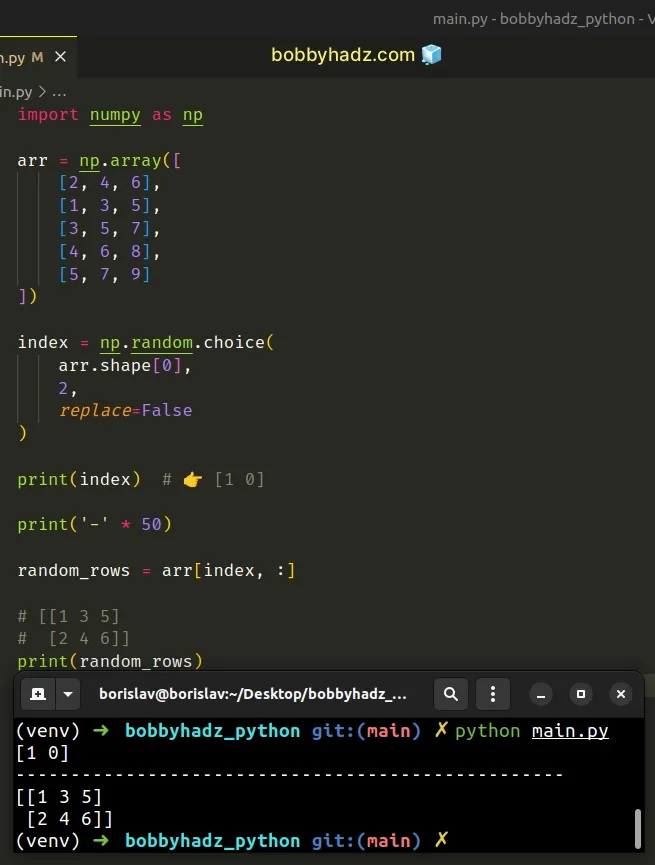
The numpy.random.choice() method generates a random sample from a given 1-D array.
We used the method to generate an array of 2 random indexes.
The replace argument determines whether the generated random sample is with
or without replacement.
False to generate the sample without replacement.By default, it is set to True.
You won't get
duplicate indexes
(and rows) when replace is set to False.
# Defining a reusable function
If you have to do this often, define a reusable function.
import numpy as np def random_rows(array, size=1): return array[ np.random.choice(len(array), size=size, replace=False), : ] arr = np.array([ [2, 4, 6], [1, 3, 5], [3, 5, 7], [4, 6, 8], [5, 7, 9] ]) print(random_rows(arr, 2)) print('-' * 50) print(random_rows(arr, 3))
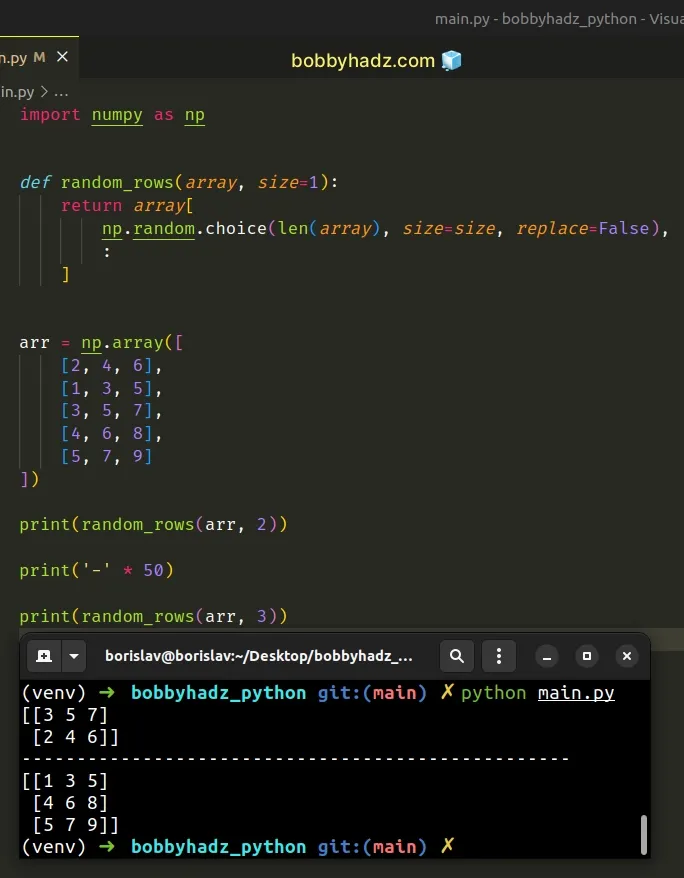
The function takes a NumPy array and the number of random rows as parameters.
It uses the numpy.random.choice() method to get an array of random indexes and
accesses the supplied array at the generated indexes.
The replace argument is set to False, so no duplicate rows will be selected.
# Get N random Rows from a NumPy Array using numpy.random.shuffle()
You can also use the numpy.random.shuffle() method to get N random rows from a NumPy array.
import numpy as np arr = np.array([ [2, 4, 6], [1, 3, 5], [3, 5, 7], [4, 6, 8], [5, 7, 9] ]) np.random.shuffle(arr) # [[4 6 8] # [5 7 9]] print(arr[:2, :]) print('-' * 50) # [[4 6 8] # [5 7 9] # [2 4 6]] print(arr[:3, :])
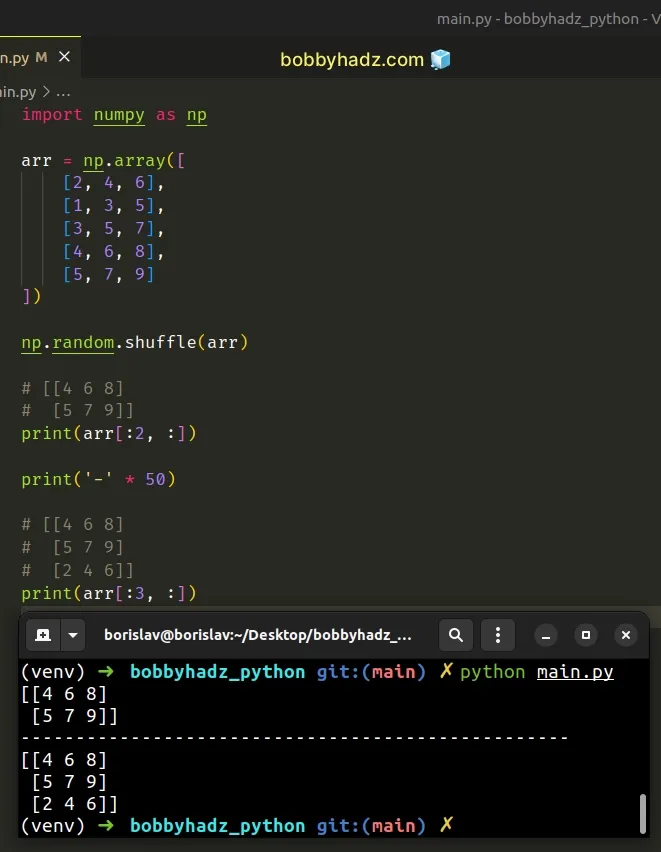
The numpy.random.shuffle method shuffles the NumPy array in place and returns
None.
import numpy as np arr = np.array([ [2, 4, 6], [1, 3, 5], [3, 5, 7], [4, 6, 8], [5, 7, 9] ]) np.random.shuffle(arr) # [[1 3 5] # [4 6 8] # [5 7 9] # [3 5 7] # [2 4 6]] print(arr)
Once we have the shuffled array, we can use indexing to select N random rows.
I've also written an article on how to shuffle two NumPy arrays in unison.
# Additional Resources
You can learn more about the related topics by checking out the following tutorials:
- Add a column with incremental Numbers to a Pandas DataFrame
- Usecols do not match columns, columns expected but not found
- ValueError: Shape of passed values is X, indices imply Y
- ValueError: Length of values does not match length of index
- Pandas: Find first and last non-NaN values in a DataFrame
- How to flatten only some Dimensions of a NumPy array
- Removing the Top and Right axis (spines) in Matplotlib

